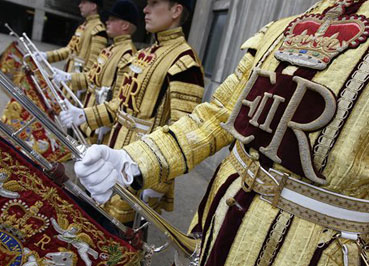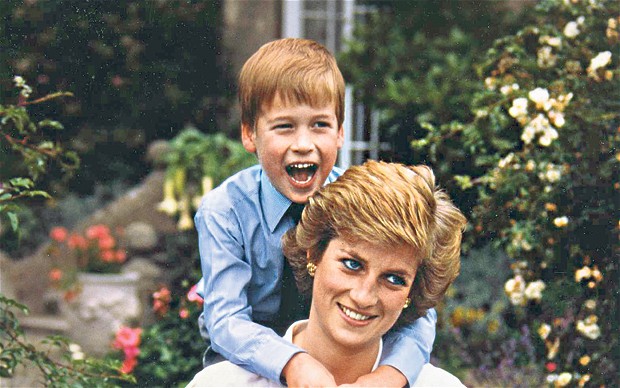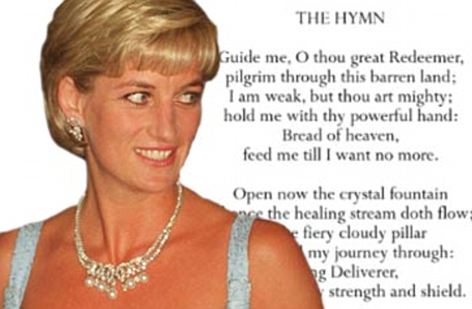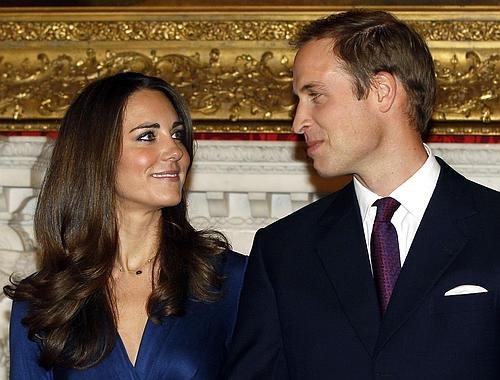The final hymn at Princess Diana’s funeral is to be the first one sung at tomorrow’s wedding ceremony, it has been revealed.
‘Guide me, O thou great Redeemer’ was also played at a memorial service to mark the 10th anniversary of her death.
The official programme for the marriage of Prince William and Catherine Middleton has been released this morning, just 24 hours before the ceremony.
It includes the full Order of Service, a personal message of thanks from the couple, and a photo of William and Kate taken by photographer Mario Testino at the time of their engagement.
The programme features Prince William’s recently updated Coat of Arms on the front cover and Miss Middleton’s new Coat of Arms on the back cover.
The Order of Service includes full details about the processions, music, hymns, prayers and readings. The wedding service itself is taken from the Book of Common Prayer. There will be one Lesson during the service, which the couple have asked Miss Middleton’s younger brother James to read.
Prince Charles was instrumental in helping William and Kate choose the music for their service, according to a St James’s Palace spokesman.
‘Catherine is very familiar with classical music. She had a lot of input from the Prince of Wales. They spent a a lot of time listening to the music together on iPods,’ he said.
He added: ‘The theme of the whole wedding is Britishness, accentuating traditional forms and crafts.
‘Catherine was very keen to include Greensleeves because it’s such a famous piece of English music.’
Music from three of Britain’s greatest composers…Edward Elgar, Benjamin Britten and Vaughan Williams, will feature in the service.
The couple have also included ‘Guide me, O thou great redeemer’ as a tribute to Prince William’s mother Diana, Princess of Wales. The hymn was sung at her funeral in 1997, so will have bittersweet memories for the groom.
Miss Middleton will walk up the aisle to the soaring coronation anthem ‘I was glad’ by Sir Charles Hubert Hastings Parry from Psalm 122.
It was composed for the coronation of Prince William’s great-great-great-grandfather Edward VII at Westminster Abbey in 1902.
As the choir begin to sing she will start her three-and-a-half minute procession,on her father’s arm, through the Nave and Choir to meet the Prince.
The spokesman added, ‘A lot of these pieces have been chosen for their theatre.
‘They are stunning pieces of music that fill the Abbey and give a sense of grandeur to the occasion.’
William and Kate have, however, added a modern twist to the proceedings. Miss Middleton specifically wanted some new music to be heard on the day.
A special fanfare entitled Valiant and Brave, after the motto of William’s RAF Search and Rescue No 22 Squadron, was composed by Wing Commander Duncan Stubbs, the Force’s principal director of music.
The 30-second celebration will be sounded by seven trumpeters and one drummer from the Central Band of the RAF as the bride and groom prepare for their procession to the Great West Door.
A new piece for The Anthem was also written by British choral composer John Rutter as a gift from the Dean and Chapter of Westminster Abbey.
In a nod to the island where they have set up home, Prince William of Wales and Miss Middleton selected a work by modern composer Paul Mealor, who has a studio on Anglesey, for The Motet.
Mr Mealor said, ‘The ceremony is going to be, without a doubt, the most emotionally intense and exhilarating hour of my life.’ He plans to watch the wedding on television with his mother.
There are also a number of crossovers with past royal weddings.
Kate’s bridal procession music was used as The Anthem for the 1981 wedding of Prince William’s parents the Prince of Wales and Lady Diana Spencer, but Diana walked up the aisle to The Trumpet Voluntary by Jeremiah Clarke.
Other links to Charles and Diana wedding include Elgar’s Sonata for Organ Op 28, Walton’s Crown Imperial and Vaughan William’s Rhosymedre.
‘Guide me, O thou great Redeemer’ was the last hymn sung at Diana, Princess of Wales’s funeral.
William also paid a touching tribute to the marriage of his father and stepmother Camilla.
The Prince and his fiancee chose to include Farewell to Stromness by Sir Peter Maxwell Davies in their service because it featured in the Prince and the Duchess’s wedding blessing.
A St James’ Palace spokesman said: ‘It’s a personal touch to the couple, an acknowledgement of William’s father and the Duchess of Cornwall.’
The hymn ‘Love divine, all loves excelling’ also featured at the 2005 service.
Kate’s brother James Middleton will give The Lesson, reading Romans 12: 1-2, 9-18, as he stands at the the Great Lectern. He will declare ‘Let love be genuine’ during the only reading in the service.
Prayers will be said to bestow the ‘gift of children’ on the couple and that they may see them ‘virtuously brought up’.
The congregation will also pray that William may love and cherish his wife and that Kate may be ‘faithful to her husband’.
Two choirs, one orchestra and two fanfare teams will perform the music at the wedding service. These include The Choir of Westminster Abbey, The Chapel Royal Choir, The London Chamber Orchestra, The Fanfare Team from the Central Band of the Royal Air Force and The State Trumpeters of The Household Cavalry.
The choirs will be under the direction of Mr James O’Donnell, Organist and Master of the Choristers at Westminster Abbey. The Choir of Westminster Abbey is made up of 20 boys, all of whom attend the Abbey’s dedicated residential Choir School, and 12 professional adult singers, known as Lay Vicars.
The Abbey’s Sub Organist, Robert Quinney, will play the organ. The Chapel Royal Choir consists of ten Children of the Chapel, boy choristers who hold scholarships at City of London School, and six Gentlemen-in-Ordinary, who are professional singers.
The London Chamber Orchestra will be conducted by Mr Christopher Warren-Green, its Music Director and Principal Conductor. The orchestra will comprise 39 musicians located in the organ loft of the Abbey. It was founded in 1921 by Anthony Bernard.
HRH The Duchess of Cornwall is a patron of the orchestra. A fanfare team of seven musicians from the Central Band of the Royal Air Force will perform under the direction of Wing Commander Duncan Stubbs. The Central Band was established in 1920 and provides musical support to the RAF throughout the UK.

On the wedding day, 150,000 copies of the programme will be sold by 60 Explorer Scouts and 80 Cadets (supervised by adults) for £2 per copy at locations in Green Park, Hyde Park, St James’s Park and Trafalgar Square. Profits from the sale of the Official Programme will go to benefit The Foundation of Prince William and Prince Harry.
The Official Programme will also be available for free electronically in two formats: as apage-turning Ceros PDF(using Flash) and an iBook compatible with Apple products, which can be downloaded from the Apple iBookstore.
The service will be recorded and released by Decca Records as a download tomorrow evening. It will be released on CD and vinyl on May 4.
by Robbo Green




